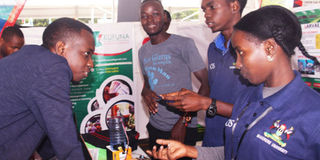Nuwagaba wants to improve irrigation

Collins Nuwagaba (left) explains his innovation at the science, technology and innovation exhibition week at Parliament last December. COURTESY PHOTO
What you need to know:
- This got him thinking about something he could do to ease work for farmers. He notes that agriculture is predominantly rain-fed and often suffers weather changes.
- The first is the automatic/ auto irrigation system that automatically irrigates the garden and the micro controller, the main system of operations
Today we live in a world surrounded with technology and innovations and Collins Nuwagaba, 23, a student at Uganda Technology and Management University, capitalised on this to create an innovation that can solve one of Uganda’s challenges.
“The agricultural sector in Uganda contributes about 24.6 per cent of GDP and provides a livelihood for more than 72 per cent of the economically active population and provides most of the raw materials to agro-based industries.
However, we were going to Yumbe one time and I kept seeing a lot of land that was unutilised. Even those who farmed did just a small piece of land,” says Nuwagaba, who is pursuing a Master’s degree in Computer Security.
This got him thinking about something he could do to ease work for farmers. He notes that agriculture is predominantly rain-fed and often suffers weather changes. Though irrigation is continually being appreciated, he wants to come up with something better, something smarter.
“We are still using traditional methods of farming yet the rest of the world is using smart and intelligent farming. So, I thought improving the irrigation system we would be a step in the right direction, hence the Intelligator innovation that autonomously irrigates gardens,” he explains.
The innovation
This gets its name from two words; intelligent and irrigator. Divergent from the normal irrigation systems which are only mechanical and often operated manually, the Intelligator has an intelligent aspect to it. Nuwagaba employs his background in computer engineering to have a computer controlled distribution of water to the different parts of the garden.
How it works
“It’s architecture involves two parts: the control system, which is installed in the farmers garden and the data acquisition system, which is the most interesting part to me. This part is the actual revolution,” Nuwagaba says.
The control system has two modes. The first is the automatic/ auto irrigation system that automatically irrigates the garden and the micro controller, the main system of operations.
“This is the hardware that is installed to help check for the soil moisture in the garden, the temperatures using sensors in order to trigger irrigation or not, at any time. For example, if it rained last night and the moisture in the soil is high, but it is also shinning, it reads the data which is sent to the mind of the system and then decides to either irrigate or not,” he explains.
Therefore, the system has a number of sensors: the soil moisture sensor, which is planted in the garden, the temperature sensor, which picks signals of the temperature in the garden or area and an ultrasonic sensor, which is installed on the water source to measure water levels at given periods of time.
All these feed in a control system – a micro controller that is the main system of the operations. This is what reads all these signals and triggers the irrigation.
The system can work with any irrigation structure; even with an already exciting one onto which it can just be mounted.
Stage of innovation
The system is still in prototype state and not yet on the market.
“The one thing that is missing is to install the system on an actual model garden. I am currently saving money so I can buy the equipment and set up a model irrigation system before the end of the year. In regards to the software, I am also still working on the programming of some devices and the data analysis,” he says anticipating that within one year, the system will be on the market.
Youth and innovations
On innovators who often never realise the value of their work, Nuwagaba says though there are so many competitions in high school and universities, with students coming up with very good innovations, in the end they don’t benefit from it and neither does the country.




